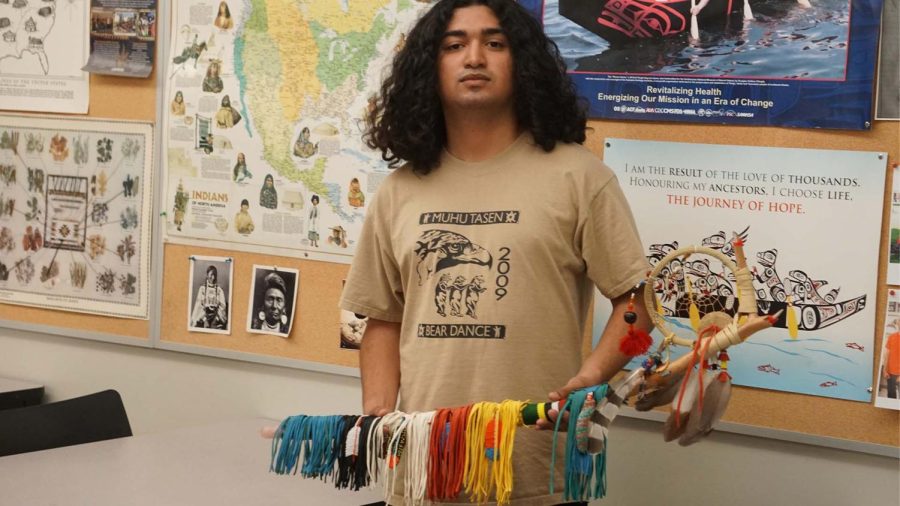Club Receives Historic Peoples Staff
The staff commemorates 100 years since Indigenous Americans first gained citizenship
After burning sage, Native American Inter-Tribal Student Alliance President Abe Gaumot holds The Peoples Staff on April 1 and feels a connection to those that came before him.
Mt. SAC’s Native American Inter-Tribal Student Alliance received a staff, named The People’s Staff, to highlight the Native American Citizenship Act. In 2024, the act will have its 100-year anniversary.
The staff’s components have symbolic significance.
The soapstone in the center represents strength, while the dreamcatcher symbolizes unity and denotes the mythological beings of Mother Earth and Father sky with its colors. The eagle feathers were placed by spiritual elder Robertjohn Knapp, who provided the school with the staff, represents guidance. The eagle itself holds different symbolic meanings.
“When you touch it, pray into it,” NAISA adviser Frances Borella said. “The staff, at this point, has been to multiple groups. It’s full of good prayers.”
These prayers cross generations.
“The staff is a prayer from all Indigenous peoples voices of the past to open up all doors to the future,” Six Bears, the spiritual elder who created the staff, said. “It helps to educate us, make us aware, and help us remember and heal.”
Before the 20th century, citizenship was mostly granted to those of one-half or less Native American blood. After World War I, a bill was passed giving citizenship to Native American veterans that served in the war. On June 2, 1924, Congress enacted the Native American Citizenship Act, which applied to all Indigenous people. This law affected the citizenship status of over 125,000 people.
Despite the passage of the bill, Native Americans were not afforded the same voting rights as white Americans. In 1938, 12 years after the law came into effect, seven states still did not allow Native Americans to vote and it was not until 1957 that their suffrage was permitted in every state because of judicial rulings.
Borella also emphasized that the staff brings attention to the racial inequality that Indigenous peoples still face.
According to data collected by the National Community Reinvestment Coalition, Native Americans have the highest poverty rate and lowest educational achievements compared to other racial groups. Research from the University of Minnesota found that they are also disproportionately affected by COVID-19.
After being held at Mt. SAC, the staff will be passed along to Cal State San Bernardino, where it will then travel back to Six Bears in time for the centennial anniversary of the act.




